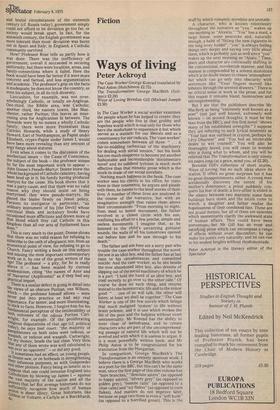Ways of living
Peter Ackroyd
The Case Worker George Konrad translated by Paul Aston (Hutchinson £2.75) The Transformation George MacBeth (Gollancz £2.20) Ways of Loving Brendan Gill (Michael Joseph £3.50)
In The Case Worker a social worker examines the people whom he has helped to create; they are the people who live in that grubby and hopeless world which is real only for those who have the misfortune to experience it but which serves as a statistic for our liberals and as a constituency for our radicals. The 'case worker' comes somewhere between all three: " . a fair-to-middling technician of the machinery for dealing with social tension," but his book has too much eloquence to become yet another fashionable and inconsiderable 'documentary novel' and its subdued lyricism is much more effective than that mimetic prose which is the stock-in-trade of our social novelists.
Nothing much happens in the book. The case worker sees his clients in his office, he visits them in their tenements, he argues and pleads with them, he listens to the brief stories of their lives. A number of these lives are analysed in the course of the narrative, but with an imaginative strength that raises them above their circumstances: "From morning to night, from meal to bowel movement, the father revolved in a closed circle with his son, confining his effort to a few precise, simple and useless movements. I imagine that, as he listened to the child's unvarying guttural sounds, the walls of all his tomorrows opened out before him and he saw through to his death."
The father and son here are a sorry pair who trouble the case-worker throughout the novel; the son is an idiot boy, and the father has at last risen to his circumstances and committed suicide. And the case worker, as he sits beside the now abandoned idiot boy, also dreams of slipping out of the social machinery of which he is a part: "I held the hand of an idiot boy, and tried secretly to go over to the other side." Of course he does no such thing, and returns instead to the bureaucratic life and to the minor good: " ... one of us will talk, the other will listen; at least we, shall be together." The Case Worker is one of the few novels which brings that much maligned 'system' to life without brash polemic, and it is one which evokes the life of the poor and the helpless without overt sentimentality. Mr Konrad has the ability to steer clear of melodrama, and to create characters who are part of the uncomprehend ing passage of natural life which will not be averted and with which it is useless to argue. It is a most powerfully written book, and Mr Philip Aston is to be congratulated for his translation from the Hungarian.
In comparison, George MacBeth's The Transformation is an entirely spurious work. I believe there is a George MacBeth who works as a poet for the BBC, but this can't be the same man, since the first page of this slim volume has "bare branches," "desolate asters" (as opposed to happy asters), "silvery grey" (as opposed to golden grey), "remote calm" (as opposed to a close calm) and "icy flakes" (as opposed to corn flakes). And matters do not improve later, because on page two there is even a "soft hush" (as opposed to a horrified groan). This is the stuff by which romantic novelists are unmade.
A character, who is known relentlessly throughout the narrative as "you," wakes up one morning as "Alcestis." "You" has a maid, a large house, some peacocks and, naturally enough, a habit of "fitting the new cigarette in the long ivory holder"; "you" is always feeling things very deeply and saying very little about them, which is probably just as well since "you" wakes up the next morning as "Alaric." Time, place and character are continually shifting in the conventional, novelettish manner, and this manner is compounded by a solemn monotone which is no doubt meant to create 'atmosphere' but which can go only into obscurity with sentences like "Your fingers moved like lobsters through the scented drawers." There is no critical sense at work in the prose, and for this reason it remains bland, humourless and uncomprehending.
But I see that the publishers describe Mr MacBeth as being "extremely well known as a poet" (not just well known, extremely well known — on second thoughts, it must be the man from the BBC), and this first novel "shows many of his established strengths." I suppose they are referring to such lyrical moments as "Your face was outlined in crayon, perhaps by Levy-Dhurrner" and "You feel an intolerable desire to wet yourself." You will also be thoroughly bored, you will cease to wonder who is doing what to whom, and you will be relieved that The Transformation is only ninety six pages long (at a price, mind you, of £2.20).
Brendan Gill's collection of short stories, Ways of Loving, has no such ideas above its station. It offers no great surprises but it has no great disappointments, either. A young man accidentally discovers the extent of his mother's dominance; a priest suddenly conquers his fear of death; a love-affair is ended in the silence between two martinis; some farm buildings burn down and the locals come to watch; a daughter and father realise the hopelessness of their combined fate. These are not grand themes, but all of them are episodes which momentarily clarify the awkward state of human affairs. This could have been portentous, but Mr Gill has an even and satisfying prose which can encompass a range of effects without overt discomfort; he can make his points very naturally, and he can rise to his modest heights without rhodomontade.
Peter Achroyd is the literary editor of the Spectator


































 Previous page
Previous page